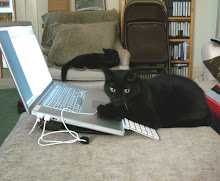Well, we've seen "The Black Rider, the Casting of the 12 Magic Bullets" twice now and I do have a few more clues.
Firstly, let me say that I did enjoy it a heckuva lot more the second time. I'll grant that the first time round it was still during previews, and by last night, many of the technical glitches (long pauses between scenes, obvious mistimings, sound problems) seemed to be largely ironed out. However, I still walked away from the play unwilling to call it a masterpiece. Perhaps a very interesting experiment, a work-in-progress, but far from satisfying.
A little bit of reading and research after my first viewing turned up some interesting ideas underlying the show. For instance, I had not known that William Burroughs, the author of the play's text, had shot his second wife -- albeit, accidentally -- while attempting to reenact William Tell's shooting an apple off the head of his son. Although he was reputed to be a good marksman, Burroughs missed, with fatal consequences and the incident would color his entire literary career, including the "Black Rider." Indeed, the play's protagonist is named Wilhelm, and I don't think I'm giving away anything to reveal that with his last magic bullet he unintentionally kills his wife.
Among the other pieces of information I learned was that I was not hallucinating and the "Cabaret", "Cabinet of Dr. Caligari" proto-Fascist themes were indeed intentional. One commentator even proposed that the extra "ss" that appear in the title on the curtain ("The Black Rider: The Cassting of the Magic Bulletss") were in fact a reference to the Nazi SS. I continue to maintain, though, that I never heard 12 bullets cast, or even 12 bulletss casst and I counted shots during the play. However, I was glad to hear that there was some reasoning behind the choices even if I still couldn't help wanting to slither into a Joel Grey chorus of "Wilkommen, Bienvenue, Welcome..." every time I saw the actors prance out.
Which brings me to what I think I have identified as the thing that really bothered me. As a dancer and a dance reviewer, movement quality stands out to me. Wilson's biography includes time spent with choreographers like Merce Cunningham. But in this auteur-driven production, in which Wilson directed, designed the sets and lighting and choreographed, the movement was the weak point. These actors are not dancers, and yet Wilson's vision of "The Black Rider" seems to demand wildly quirky movement, to go along with the weird voicing and peculiar characterizations. To my mind, this was a style that, frankly, the actors were not prepared to take on.
Although a Wilson-fan might insist that movement was a key consideration in the direction of the play, ("Look at the way they walk, at the way they move their arms just so, at the carefully posed interactions between the characters...") there was a naivete to this "choreography." These are not professional dancers -- there are limits to the movements they were capable of executing while singing and acting in an awkward costume. But the movements they were given never came off as more than elaborate blocking and affected posturing.
It was the kind of thing you or I or really anyone could do -- Ministry of Funny Walks entrances, flowing in and out of scenes with hands posed as if they were choristers, fey wristed Al-Jolson squats -- but nothing so extreme that it matched the oddness of their the clown-white faces or the chilling sound of a prissy falsetto voice dropping into grating, bear-like baritone.
The great Martha Graham once said that movement never lies, and in this case, for me, inauthentic movement sucked away all the interest of the production. It would have been better to hire an actual choreographer -- someone with a background in experimental movement. After all, when the Rider was first developed, Wilson knew he wasn't a composer and instead turned to someone who knew more about music than he did.
The one scene which I liked best, and which I still do, was the scene at the crossroads in act 2. Crossroads are traditionally places of tormented spirits. Back through ancient times, they are associated with the dead, and some traditions note that if you wanted to make a deal with the devil, you went to the crossroads to meet him. The Delta bluesman Robert Johnson evokes just that in his "Cross Road Blues."
"I went down to the crossroads and fell down on my knees, asked the Lord up above for mercy, save poor Bob if you please."
"Black Rider's" crossroads tap into that archaic sense of the evil and mystery at the place where various ways intersect, where people meet and pass without even noticing the tortured character right at the center.
It makes me rue the missed opportunity -- what if the whole evening had been that good?
Friday, September 03, 2004
Black Rider, Part Deux
Posted by
Mary Ellen Hunt
at
3:44 PM
![]()
Subscribe to:
Post Comments (Atom)

No comments:
Post a Comment